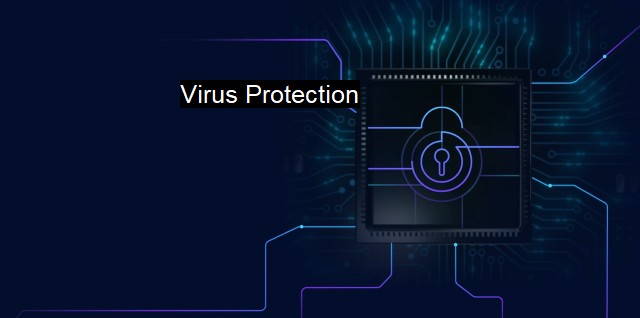What is Virus Protection?
Virus Protection: The Essential Cybersecurity Safeguard for Identifying and Mitigating Malware Risks
Virus protection in the context of cybersecurity refers to specific measures implemented to safeguard and protect computing systems. It provides preventive and curative mechanisms against malicious software, sometimes known as malware, which includes viruses, Trojan horses, worms, spyware, adware, and ransomware. These cyber threats exploit vulnerabilities in a computer system to either gain unauthorized access or cause damage to data or the system.Antivirus programs are central to virus protection, offering various services designed to detect, prevent, and neutralize threats to the computing system. They constitute an essential barrier between your device and various malware threats lurking on the internet, emails, or foreign systems. Typically, these programs function by scanning a device for existing infections, carrying out real-time preventive scanning, and warning users against potentially harmful online resources.
The most common method employed by antivirus programs to track down malware is by using a comprehensive library of virus definitions already known to them. The scanners compare the programs on your device against this vast library, thereby identifying viruses based on patterns or behaviors similar to known viruses. heuristic analysis or behavior-based detection is a strategy whereby a program's proclivity to perform malware-like actions is taken into account, even if the program isn't in the virus definition library.
Preventative virus protection acts as a shield to block known risks and those that appear suspicious. By conjoining multiple virus detection techniques, antivirus software provides robust protection against malware and lessens the chance of new threats slipping through unrestrained. antivirus programs present warnings about secure and insecure websites, suspect downloads, email attachments, and more, hence reducing users' risk of inadvertently coming into contact with malware.
Antivirus software updates virus definitions constantly. The cybersecurity landscape is continually evolving, with new threats emerging daily. By regularly updating the antivirus's virus library, it can offer top-notch protection against existing and emerging threats.
Beyond acting as a primary line of defense against malware, antivirus often comes bundled with additional features designed to promote comprehensive protection and an altogether healthier computing system. These features could include email filters to help detect and banish potential email-based threats, automatic scanning of removable storage, Virtual Private Network features for safer online browsing, personal data protection, safe banking, among others.
Virus protection also involves regular scanning and cleansing of the system. It is of extreme importance because even while preventive systems may fail and a virus infiltrates the device, curative measures can detect these latent threats and eliminate them.
Education on safe online practices is another vital element surprisingly often sidelined by an over-reliance on antivirus programs. Awareness about malware threats, discerning malicious emails, maintaining strong and varied passwords, regular updating of systems and applications, and a thoughtful approach towards online sharing are just some of the ways individuals can fortify their armor beyond antivirus programs.
Employing excellent virus protection methods is crucial to ensure a secure cyberspace and enjoy an uninterrupted experience. Recent times have seen malware deployed for highly damaging large-scale cyberattacks. Hence, realizing the importance of virus protection and incorporating an effective antivirus program, alongside mindful surfing practices, could make a world of difference. Given the breadth of our current internet usage and the sheer daily frequency of new threats, virus protection should be seen as a health habit that just simply must not be ignored. In sum, virus protection offers a fundamental way and an invaluable intervention in the broader cybersecurity landscape, enabling individuals and organizations to safely navigate this digital age.

Virus Protection FAQs
What is virus protection?
Virus protection refers to the use of software programs and other security measures to protect a computer from malware, viruses, and other types of cybersecurity threats.Why is virus protection important?
Virus protection is important because it helps prevent cyber attacks that can result in data theft, financial loss, or damage to computer systems.What are some common virus protection software programs?
Some common virus protection programs include Norton AntiVirus, McAfee Antivirus, Kaspersky Anti-Virus, and Avast Antivirus.How often should I update my virus protection software?
You should update your virus protection software regularly, ideally at least once a day or as often as the software provider recommends. This ensures that your computer has the latest protection against new and emerging cyber threats.| | A | | | B | | | C | | | D | | | E | | | F | | | G | | | H | | | I | | | J | | | K | | | L | | | M | |
| | N | | | O | | | P | | | Q | | | R | | | S | | | T | | | U | | | V | | | W | | | X | | | Y | | | Z | |
| | 1 | | | 2 | | | 3 | | | 4 | | | 7 | | | 8 | | |||||||